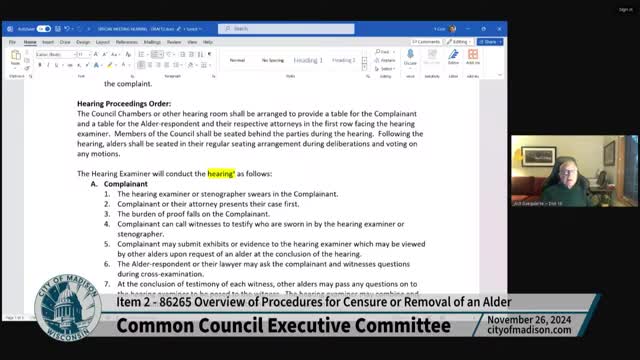Council outlines unprecedented process for alder removal
November 27, 2024 | Madison, Dane County, Wisconsin
This article was created by AI summarizing key points discussed. AI makes mistakes, so for full details and context, please refer to the video of the full meeting. Please report any errors so we can fix them. Report an error »

In a recent government meeting, officials discussed the procedural framework for handling complaints against elected officials in Madison, Wisconsin. The conversation centered on the statutory requirements for removing an alder from the council, emphasizing the need for a verified complaint filed by a resident taxpayer.
Attorney Haskin outlined the existing gaps in the statutes, which stipulate that an alder can only be removed for cause and that due process must be afforded to the accused. This includes providing notice of the charges, allowing the alder to respond, and enabling them to present evidence and question witnesses during a hearing. The proposed framework aims to fill these gaps and ensure a fair process.
The council acknowledged that such removal processes are rare in Madison, with no prior instances reported in recent years. The discussion highlighted the lack of judicial precedents interpreting the relevant statutes, which complicates the establishment of a clear procedural path.
Key features of the proposed process include mandatory scheduling of a hearing following a complaint, with provisions for hiring a stenographer and a hearing examiner to oversee proceedings. The council would also have the authority to require complainants to post a $1,000 bond to cover potential hearing costs, which would be refundable if the complaint is deemed valid.
The meeting underscored the importance of maintaining a structured approach to ensure that all parties involved have the opportunity to present their cases, thereby upholding the principles of due process within the council's operations.
Attorney Haskin outlined the existing gaps in the statutes, which stipulate that an alder can only be removed for cause and that due process must be afforded to the accused. This includes providing notice of the charges, allowing the alder to respond, and enabling them to present evidence and question witnesses during a hearing. The proposed framework aims to fill these gaps and ensure a fair process.
The council acknowledged that such removal processes are rare in Madison, with no prior instances reported in recent years. The discussion highlighted the lack of judicial precedents interpreting the relevant statutes, which complicates the establishment of a clear procedural path.
Key features of the proposed process include mandatory scheduling of a hearing following a complaint, with provisions for hiring a stenographer and a hearing examiner to oversee proceedings. The council would also have the authority to require complainants to post a $1,000 bond to cover potential hearing costs, which would be refundable if the complaint is deemed valid.
The meeting underscored the importance of maintaining a structured approach to ensure that all parties involved have the opportunity to present their cases, thereby upholding the principles of due process within the council's operations.
View the Full Meeting & All Its Details
This article offers just a summary. Unlock complete video, transcripts, and insights as a Founder Member.
✓
Watch full, unedited meeting videos
✓
Search every word spoken in unlimited transcripts
✓
AI summaries & real-time alerts (all government levels)
✓
Permanent access to expanding government content
30-day money-back guarantee

